Lead Like It Matters to God: Values-Driven Leadership in a Success-Driven World by Richard Stearns

Author:Richard Stearns [Stearns, Richard]
Language: eng
Format: epub
Tags: Christianity, business
ISBN: 9780830847310
Google: A3D6DwAAQBAJ
Publisher: InterVarsity Press
Published: 2021-03-30T04:00:00+00:00
WHEN MONEY BECOMES TOXIC
The pursuit of money can have all kinds of unintended consequences where we work. The almost-universal human quest for more money and greater wealth infects virtually every organization on the planet. The love of money, like the drive for success, is like that carbon monoxide leak in your home: you canât see it, smell it, or taste it, but it can poison you if youâre not careful.
MONEY IS A NECESSARY BUT DANGEROUS THING THAT MUST BE HANDLED WITH CARE.
Stop and think for a moment about the pervasive influence of money in your place of work. All of us are paid with money. Money is used as a proxy for your worth as an employee, with more âvaluableâ employees being paid more than less valuable employees. Incentive systems almost always involve money. Perform well and you will get more of it; perform poorly and you will get less. Money creates jealousies and inequities in our workplaces, and those paid less often resent those who are paid more. Money can be like gasoline on the fire of office politics as it motivates some people to posture and maneuver so that they are in the best position to get more money than their coworkers. Money provokes some people to lie or misrepresent their results. Money can also motivate theft, embezzlement, or even just cheating on expense reports. And, if thatâs not enough, money is the motive for a huge percentage of all crimes committed in the world. Money is a necessary but dangerous thing that must be handled with care. Again, while money is an essential tool, it is also a âdrugâ with a lot of adverse side effects.
But perhaps more damaging than all the above is that money sometimes replaces purpose in an organization. Let me say that again: money sometimes replaces purpose. Steve Jobs, the cofounder of Apple, said this about money: âAppleâs goal1 isnât to make money. Our goal is to design and develop and bring to market good products. . . . We trust as a consequence of that, people will like them, and as another consequence, weâll make some money. But weâre really clear about what our goals are.â
Isnât it interesting that the creator of one of the most successful companies in history said that their goal was not to make money? Steve Jobs understood that money is no substitute for purpose. Apple became a great company because he focused on its higher purpose to design and develop remarkable products. Money can become a counterfeit purpose that infiltrates an organization and over time replaces its higher purpose. At first, it may be unnoticeable, and the company can continue to perform well. But over time, if a higher purpose isnât lifted up by its leaders, the company just becomes a host organism for people who want to extract money from it. And the people who work there become just pawns on the gameboard, the means to the end of bigger salaries and bonuses for the executives and shareholders.
Download
This site does not store any files on its server. We only index and link to content provided by other sites. Please contact the content providers to delete copyright contents if any and email us, we'll remove relevant links or contents immediately.
The 5 Love Languages: The Secret to Love That Lasts by Gary Chapman(9784)
The Space Between by Michelle L. Teichman(6929)
Assassin’s Fate by Robin Hobb(6199)
Wiseguy by Nicholas Pileggi(5770)
Everything Happens for a Reason by Kate Bowler(4733)
Gerald's Game by Stephen King(4641)
Pillow Thoughts by Courtney Peppernell(4271)
A Simplified Life by Emily Ley(4157)
The Power of Positive Thinking by Norman Vincent Peale(4061)
Harry Potter and the Prisoner of Azkaban (Book 3) by J. K. Rowling(3347)
Resisting Happiness by Matthew Kelly(3337)
Girl, Wash Your Face by Rachel Hollis(3282)
Being Aware of Being Aware by Rupert Spira(3272)
The Secret Power of Speaking God's Word by Joyce Meyer(3178)
The Code Book by Simon Singh(3177)
More Language of Letting Go: 366 New Daily Meditations by Melody Beattie(3020)
Real Sex by Lauren F. Winner(3014)
Name Book, The: Over 10,000 Names--Their Meanings, Origins, and Spiritual Significance by Astoria Dorothy(2978)
The Holy Spirit by Billy Graham(2944)
